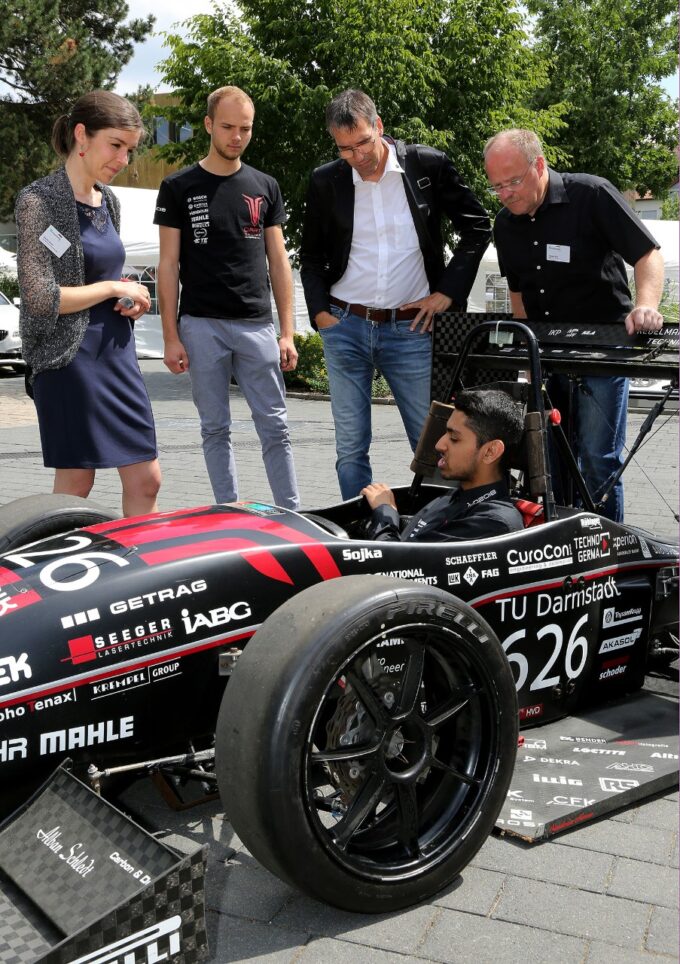Fraunhofer LBF celebrates 80 years of "Research with a system!
The Fraunhofer Institute for Structural Durability and System Reliability LBF welcomed over 100 guests from politics, business and science to Darmstadt on June 21. A future workshop on the topic of predictive maintenance with intelligent components and systems and the opportunity to gain insight into the otherwise closed laboratories attracted project partners and companions from all over Germany.

Fraunhofer LBF has been doing pioneering work for 80 years. Digitization as one of the key technologies of the future has long permeated research and development processes. Simulation, digital images of mechanical systems, hardware-in-the-loop, the boundaries between physical and virtual reality are becoming increasingly blurred. New products, for example in mechanical engineering and mobility, are being developed in ever shorter cycles, but at the same time have to meet increasing demands for product individualization with ever higher reliability requirements. Participants of the LBF Future Workshop discussed the generation, opportunities and limitations of so-called "digital twins" in the product development process.
With digitalization, traditional mechanical engineering is experiencing exciting, completely new perspectives and product solutions at a rapid pace. As a result, products are becoming increasingly complex in terms of their functions and design. "With all this complexity, it remains a matter of course for the user that the new products function reliably and safely. This is what the Fraunhofer LBF stands for with its reliability research," said Professor Reimund Neugebauer, President of the Fraunhofer-Gesellschaft, in his welcoming address.
In addition, future product requirements in terms of economic efficiency and sustainability demand modern lightweight solutions, where developers are increasingly pushing the limits of what is feasible today. Here, too, it goes without saying that the products must be lightweight and safe.
"Intelligent components" - The future of maintenance
Digitalization and Industry 4.0 are also leading to a paradigm shift in the area of reliable operation of equipment and systems: Whereas yesterday maintenance and servicing intervals were still carried out according to the best of our experience and at defined intervals, or we reacted to the failure or malfunction of a machine, predictive maintenance approaches are increasingly making it possible to forecast possible defects before they actually occur by means of continuous, operation-accompanying status recording and algorithmic data interpretation.
This requires comprehensive knowledge of damage causes and damage progression - knowledge that the LBF has been updating for 80 years of lightweight construction research. Applications can be found in traffic engineering, production machinery and energy supply.
Against this background, individual components are increasingly being equipped with sensors, information technology and, in some cases, actuators, which in their entirety provide status data about themselves and also the surrounding system and can favourably influence the current status by means of actuators. Despite the great opportunities of predictive maintenance, technical issues are still unresolved and different applications have individual requirements.
Which usable data is available, which is still needed? How can individual sensor data be combined to form a meaningful overall picture? What are the implications of "warning messages"? Corresponding discussions between guests and LBF scientists were underpinned by presentations of exhibits from reliability research.
Behind the scenes in the "OpenLab
In the "OpenLab", guests were able to gain insights into "Digitization in Reliability and Lightweight Construction Research" and take a close look at R&D work at the LBF that contributes to future-relevant topics such as "experimental-virtual reliability simulation", "smart, adaptive systems", "sustainable lightweight construction" or "plastics recycling". Highlights were live demonstrations that vividly showed how recycling and upcycling of plastics can be worthwhile, for example, or how differently innovative façade materials, some of them made of biomaterials, react to heat development.
A multi-physical test facility based on a multi-axial vibration table (MAST) for structural components and battery systems, the only one of its kind in Germany, offered the opportunity to experience tests on electric vehicles in real life. Other exhibits showed, among other things, implemented hybrid lightweight components, the driving simulation of an electric vehicle networked with external partners, and large and small test benches for reliability research.
More about the Fraunhofer LBS anniversary day can be found at here









